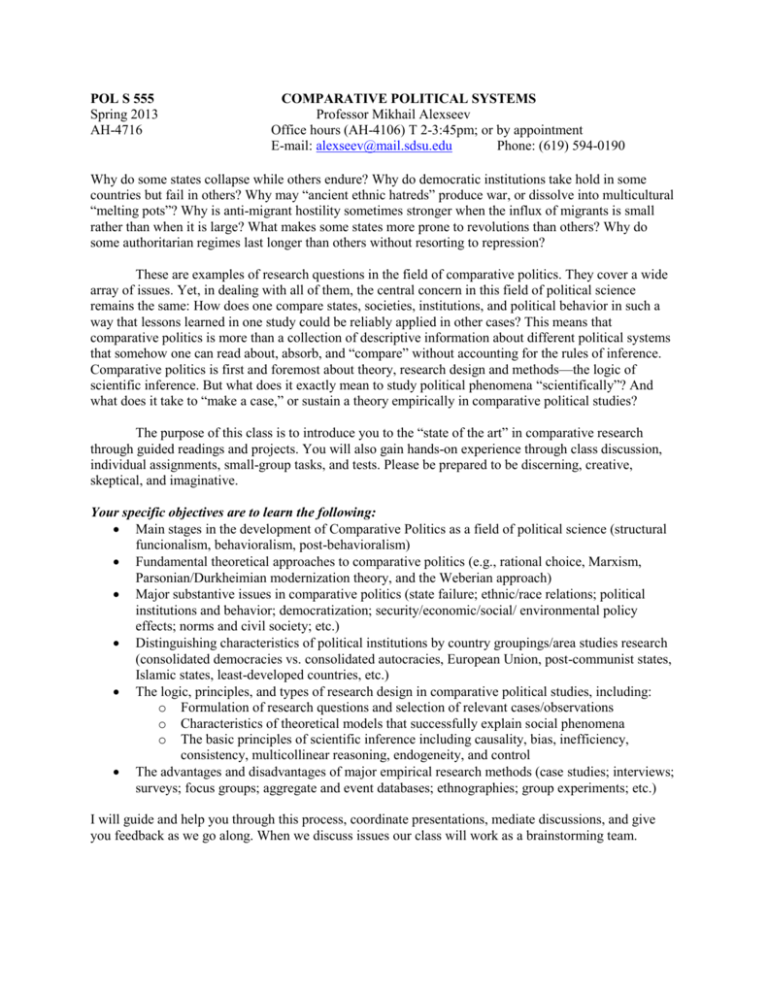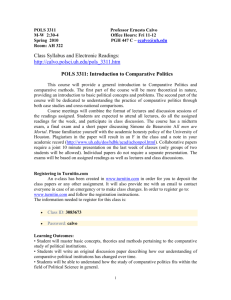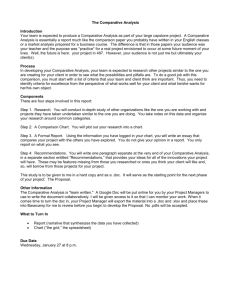pol s 555 comparative political systems
advertisement

POL S 555 Spring 2013 AH-4716 COMPARATIVE POLITICAL SYSTEMS Professor Mikhail Alexseev Office hours (AH-4106) T 2-3:45pm; or by appointment E-mail: alexseev@mail.sdsu.edu Phone: (619) 594-0190 Why do some states collapse while others endure? Why do democratic institutions take hold in some countries but fail in others? Why may “ancient ethnic hatreds” produce war, or dissolve into multicultural “melting pots”? Why is anti-migrant hostility sometimes stronger when the influx of migrants is small rather than when it is large? What makes some states more prone to revolutions than others? Why do some authoritarian regimes last longer than others without resorting to repression? These are examples of research questions in the field of comparative politics. They cover a wide array of issues. Yet, in dealing with all of them, the central concern in this field of political science remains the same: How does one compare states, societies, institutions, and political behavior in such a way that lessons learned in one study could be reliably applied in other cases? This means that comparative politics is more than a collection of descriptive information about different political systems that somehow one can read about, absorb, and “compare” without accounting for the rules of inference. Comparative politics is first and foremost about theory, research design and methods—the logic of scientific inference. But what does it exactly mean to study political phenomena “scientifically”? And what does it take to “make a case,” or sustain a theory empirically in comparative political studies? The purpose of this class is to introduce you to the “state of the art” in comparative research through guided readings and projects. You will also gain hands-on experience through class discussion, individual assignments, small-group tasks, and tests. Please be prepared to be discerning, creative, skeptical, and imaginative. Your specific objectives are to learn the following: Main stages in the development of Comparative Politics as a field of political science (structural funcionalism, behavioralism, post-behavioralism) Fundamental theoretical approaches to comparative politics (e.g., rational choice, Marxism, Parsonian/Durkheimian modernization theory, and the Weberian approach) Major substantive issues in comparative politics (state failure; ethnic/race relations; political institutions and behavior; democratization; security/economic/social/ environmental policy effects; norms and civil society; etc.) Distinguishing characteristics of political institutions by country groupings/area studies research (consolidated democracies vs. consolidated autocracies, European Union, post-communist states, Islamic states, least-developed countries, etc.) The logic, principles, and types of research design in comparative political studies, including: o Formulation of research questions and selection of relevant cases/observations o Characteristics of theoretical models that successfully explain social phenomena o The basic principles of scientific inference including causality, bias, inefficiency, consistency, multicollinear reasoning, endogeneity, and control The advantages and disadvantages of major empirical research methods (case studies; interviews; surveys; focus groups; aggregate and event databases; ethnographies; group experiments; etc.) I will guide and help you through this process, coordinate presentations, mediate discussions, and give you feedback as we go along. When we discuss issues our class will work as a brainstorming team. Required Readings I. BOOKS (ordered through the Aztec Bookstore or they can be obtained elsewhere): a. Readings required for all students: Gary King, Robert Keohane, and Sidney Verba, Designing Social Inquiry: Scientific Inference in Qualitative Research, Princeton, 1994 Rawi Abdelal, Yoshiko Herrera, Alastair Iain Johnston, and Rose McDermott, Measuring Identity: A Guide for Social Scientists (Cambridge, 2009) Stephen Hanson, Post-Imperial Democracies, Cambridge University Press, 2010. Philip G. Roeder, Where Nation-States Come From: Institutional Change in the Age of Nationalism, 2007. b. Required readings for select topics (pick one to review, one to serve as discussant): Mark R. Beissinger and Crawford Young, eds. Beyond State Crisis? : Postcolonial Africa and Post-Soviet Eurasia in Comparative Perspective, Woodrow Wilson Center Press, 2002. Ian Bremmer, The J Curve: A New Way to Understand Why Nations Rise and Fall (Simon and Schuster, 2006) (desk copy order #20080104-181749) Philip Gourevitch, We Wish to Inform You That Tomorrow We Will Be Killed With Our Families: Stories from Rwanda, Farrar, Straus, and Giroux, 1998. Anna Politkovskaya, A Small Corner of Hell: Dispatches from Chechnya, Chicago, 2003. Ashutosh Varshney, Ethnic Conflict and Civic Life: Hindus and Muslims in India, Yale U Press, 2003. Barbara F. Walter and Jack Snyder, eds., Civil Wars, Insecurity, and Insurrection, Columbia 1999. McGlinchey, Eric. Chaos, Violence, Dynasty: Politics and Islam in Central Asia, Pittsburg, 2010. II. ARTICLES AND OTHER SOURCES (listed in your reading assignment handouts). Unless specified, all readings listed under the weekly reading assignments are required. Grade Components Attendance and participation in class activities Analytic book reviews (Read & Write Midterm I & II) =2 x 15% Analysis of comparative political issues: -Written critique of selected readings & its presentation in class -Serving as a discussant of a presentation (with notes) Final paper on comparative research design and contemporary issues 20% 30% 10% 10% 30% Class activities will include (but will not be limited to) lectures, question-and-answer sessions, student presentations followed by discussions/debates, small-group “task force” projects, and practice tests. You are expected to attend all class meetings and participate in class activities. Attendance score will be calculated as a percentage of class meetings you attended (minus one for gratis absences; partial attendance up to 0.5 points will be credited if a student attended at least 1.5 and not more than 2.3 hours of a class meeting; this does not apply to assignments that will be credit regardless of how much of the class was attended); participation score will be calculated as a percentage of submitted class assignments—if the latter exceed the average in scope of the material coverage, additional bonus points will be earned. NOTE: You must bring the assigned readings to class. You will need them for in-class projects and debates. No make-ups will be available for loss of points due to failure to bring readings to class. If you do not bring ALL assigned readings to class you will earn NO MORE than 50% attendance and participation points for that day (the first day of class being the only exception). NOTE: Attendance is pre-requisite for passing this class. The following standards apply: --No class participation and attendance points will be earned if more than 5 class meetings are missed. --No passing grade will be earned for the class in case of 7 or more class meetings are missed. (No assignments will be counted toward final grade in this case). Analytical essay: These will be book reviews focusing on the development of fundamental theory of comparative politics. Guidelines will be provided the week before the due date. Analysis of comparative political issues: --Presenters: Based on the chosen reading, write a 2-page summary/review of the assigned portion according to the Guidelines at the end of this syllabus. Note that your written brief is due at the beginning of class on the day of the presentations Post your review on course Blackboard, Discussion Boards for that topic Present your reviews in class Discussants: See the Guidelines. NOTE TO ALL: This is a collective learning experience. You have the opportunity to collect reviews of chapters from a wide range of readings that you will not necessarily read yourself, but you will have quick reference to them and they will help you to understand them and other readings better. ---Class presentation portion: Even though I will grade the review and the presentations separately, your presentation will contribute to the overall grade for this assignment. Think of your presentation as an opportunity to clarify and enhance the key components of your review. The important components of a good presentation are: Clarity Good examples/evidence [do not be shy using audio-visual aids such as PowerPoint or web links] Staying on time Giving competent answers to the questions from fellow students and the instructor (Failure to present when scheduled without a valid reason* is equivalent to not showing up for a written in-class test; maximum make-up value except for force majeurs circumstances is 50%) Final paper: Your will be asked to extend and revise/rewrite your presentation brief or one of the analytic reviews drawing most of all on KKV (Designing Social Inquiry)—a seminal guide to inference in social sciences. The guidelines are exactly the same except that you will be required to write 2-3 pages on each of the three parts for the total size of approximately 7 pages (double-spaced, 12-size uncondensed font, no less than 1-inch margin throughout). The purpose of this assignment is not only to help you understand and learn comparative research fundamentals, but also to give you the chance to write a paper that later you may want to convert into another course paper, a thesis proposal, journal article, and/or grant proposal. Good papers will pay off handsomely in all of the above respects and then some. Grade Scales for Tests, Papers and Final Grade Assignment: For each activity you will receive point grades according to the SDSU grading system and the average of these grades will be your final grade. In case of a “tie” I will consider the following criteria in the order in which they are listed: Attendance and active and intelligent contribution to class activities Final paper grade Grade progression from the first to the last assignment Assignments will be graded on a point system and the percent score will be converted to grades: 95-100 = A 74-77 = C 91-94 = A70-73 = C- 88-90 = B + 84-87 = B 60-69 = D range Below 59 = F 80-83 = B- 78-80 = C+ *All tests must be taken, all assignments submitted, all presentations made at the set time and date. Makeup tests or papers will be allowed only under exceptional circumstances (force of nature/force majeur events; health issues documented by a doctor; car accidents documented by police; or other appropriately documented issues excluding participation in college sports). Rights, responsibilities, and procedures See University Policies section in the SDSU General Catalog 2012-2013, pp. 466-480. NOTE: Plagiarism (copying other people’s work without attribution and presenting it as your own) is unacceptable. Engaging in plagiarism on any test will result in an automatic “F” grade for the course. Blackboard at SDSU You will use SDSU Blackboard to access announcements, the syllabus, readings, and assignments online; to participate in discussion forums; and submit the final exam. CLASS MEETINGS AND READING SCHEDULE Do all your required readings prior to the class meetings of the week for which they are assigned. Required readings are listed below under each week’s topic. Please bring the assigned readings to class— failure to do so may result in class participation grade loss or reduction. PART I: Comparative Politics as a Discipline and Its Theoretical Foundations Week 1 Jan 22 Introduction: Evolution of Comparative Politics in Political Science Munck, “The Past and Present of Comparative Politics,” in Geraldo L. Munck and Richard Snyder, Passion, Craft, and Method in Comparative Politics, The Johns Hopkins University Press, 2007 (Blackboard, Course Documents). Week 2 Jan 29 Theoretical Foundations of Comparative Political Analysis: Agency, Structure, and Time Hanson, Post-Imperial Democracies, Preface, Chapters 1-3 DUE: CHOICE OF PRESENTATION & DISCUSSANT TOPICS Week 3 Feb 5 Origins of Political Institutions of the State: Russia, Germany, France Hanson, Chs. 4-6, 7 Presenters and Discussants: Ch. 4: France, Third Republic ________________________________ ________________________________ Ch. 5: Germany, Weimar Republic ________________________________ ________________________________ Ch. 6: Russia, Post-Soviet ________________________________ ________________________________ Analytic Review Guide provided Week 4 Feb 12 READ&WRITE WEEK—ANALYTIC REVIEW: Origins of Nation-States No class meeting; students read and work independently, communicate via BB. Philip G. Roeder, Where Nation-States Come From: Institutional Change in the Age of Nationalism (2007) ESSAY DUE: 2200 (electronically, method TBD). PART II: Political Systems Week 5 Feb 19 Comparative Classification of Political Systems (Regimes): Class Exercise --Freedom House, Nations in Transit 2009 (GO TO: http://www.freedomhouse.org/template.cfm?page=485 and download: Overview Essay Methodology Nations in Transit Tables NOTE: Bring all these documents (hard copy or electronic format if you are using a laptop/PDA etc.) to class. [If the link malfunctions, Google Freedom House, click on Nations in Transit, then, on the pulldown menu click 2009]. --Shevtsova, “Russia : unconsolidated democracy, creeping authoritarianism, or unresolved stagnation?” in Beissinger and Young,Beyond State Crisis Week 6 Feb 26 Political In/Stability Bremmer, J-Curve, Chs. 1, 7 Presenters & Discussants The Far Left Side of the J Curve, Ch. 2 North Korea ___________________________________________________ ___________________________________________________ The Slide Toward Instability, Ch. 3 Iran ___________________________________________________ ___________________________________________________ The Depths of the J Curve, Ch. 4. Former Yugoslavia___________________________________________________ ___________________________________________________ The Right Side of the Curve, Ch. 5 India Week 7 Mar 5 ___________________________________________________ ___________________________________________________ Authoritarian Durability and Democratization Jay Ulfelder, “Contentious Collective Action and the Breakdown of Authoritarian Regimes,” International Political Science Review 26 (2005): 311-334 Jennifer Gandhi and Adam Przeworski, “Authoritarian Institutions and the Survival of Autocrats,” Comparative Political Studies 40 (2007): 1279-1301. Milan W. Svolik, “Power Sharing and Leadership Dynamics in Authoritarian Regimes,” American Journal of Political Science 53 (2009): 477-494 (BLACKBOARD, Course Documents) --Fareed Zakaria, “The Rise of Illiberal Democracy,” Foreign Affairs (Nov 1997) (http://www.fareedzakaria.com/ARTICLES/other/democracy.html) Part III: State Crises, Failure, and Rehabilitation Week 8 Mar 12 State Crises and Rehabilitation: Africa vs. Eurasia Beissinger and Young, Beyond State Crisis?, chps. 1, 2 Presentations of chapters: Ghia Nodia, “Putting the state back together in post-Soviet Georgia” ____________________________________ ____________________________________ Crawford Young, “After the fall: state rehabilitation in Uganda” _____________________________________ _____________________________________ Charles Fairbanks, “Weak States and Private Armies,” _____________________________________ _____________________________________ Vadim Volkov, “Violent Entrepreneurship in Russia’s Emergent Markets” _____________________________________ _____________________________________ Week 9 Mar 19 READ&WRITE WEEK—ANALYTIC REVIEW (MD-II): Civil Wars and Insurgency PICK ONE: Philip Gourevitch, We Wish to Inform You That Tomorrow We Will Be Killed With Our Families: Stories from Rwanda, Farrar, Straus, and Giroux, 1998. Anna Politkovskaya, A Small Corner of Hell: Dispatches from Chechnya, Chicago, 2003. ESSAY DUE: 2200 (electronically, method TBD Week 10 Mar 26 Models of Intra-State Violence: Grievances, Opportunity and Security Dilemmas Laitin and Fearon, “Ethnicity, Insurgency, and Civil War,” American Political Science Review (February 2003): 75-91 (PROQUEST) Jack Goldstone, Robert Bates, Ted Robert Gurr et al., “A Global Forecasting Model of Political Instability,” Paper, American Political Science Association, Annual Meeting 2005 (BLACKBOARD) Presentations: Snyder and Walter, Civil War, Ch. 1 (Snyder and Jervis) Ch. 4. Somalia _____________________________________ _____________________________________ Ch. 6 Cambodia_____________________________________ _____________________________________ Alexseev, “Societal Security, the Security Dilemma, and Extreme Anti-Migrant Hostility in Russia,” Journal of Peace Research 48(4) (2011): 509-523. _____________________________________ _____________________________________ Week 11 Apr 2 Week 12 Apr 9 ***SPRING BREAK, NO CLASS MEETING*** Islam, the State and Civil Society Presentations on McGlinchey, Chaos, Violence, Dynasty Kazakhstan Uzbekistan Kyrgyzstan ______________________________________ ______________________________________ ______________________________________ ______________________________________ ______________________________________ ______________________________________ Presentations on Varshney, Ethnic Conflict and Civic Life Aligarh and Calicut ______________________________________ ______________________________________ Hyderabad and Lucknow______________________________________ ______________________________________ Ahmedabad and Surat ______________________________________ ______________________________________ PART IV: Inference, Design, and Methods Week 13 Apr 19 Principles of Comparative Inquiry: Research Questions and Contribution to Knowledge King, Keohane, and Verba (KKV), Ch. 1 (pp. 3-32), pp. 34-69, 99-124 A practicum in paradoxes Week 14 Apr 26 Causality and Research Designs KKV, pp. 128-149, 168-195, 199-207. Critical Reading Task Force based on: Charles A. Lave and James G. March, An Introduction to Models in the Social Sciences, Harper & Row, 1975, pp. 10-48 (HANDOUT) Week 15 May 3 Measuring Identity: Comparative Research Methods Abdelal et al., Introduction, Chs 1, 2. Presentations: Ch. 4 (survey measurement of race): Ch. 7 (quantitative content analysis): Ch. 8 (cognitive mapping): Ch. 9 (constructivist datasets): Week 16 May 10 _________________________________ _________________________________ _________________________________ _________________________________ _________________________________ _________________________________ _________________________________ ________________________________ Methods (cont.), Course Review and Synthesis Abdelal et al.: Ch. 11 (ethnography): Ch. 12 (psychological experiments) _________________________________ _________________________________ _________________________________ _________________________________ Przeworski, A. and Salomon, F. “The Art of Writing Proposals: Some Candid Suggestions for Applicants to Social Science Research Council Competitions” (http://fellowships.ssrc.org/art_of_writing_proposals/) ***BRING KKV, HANSON, AND LAVE & MARCH Task Force groups on final paper outlines MAY 17 FINAL EXAM: —PAPERS DUE @ 2100 electronically, TBD Recommended supplementary readings Alan Siaroff, Comparing Political Regimes: A Thematic Introduction to Comparative Politics, 2nd edition, University of Toronto Press, 2008. Paul Spector, Research Designs, Sage, 1981. Geraldo L. Munck and Richard Snyder, Passion, Craft, and Method in Comparative Politics, The Johns Hopkins University Press, 2007. James A.Caporaso, Quasi-experimental approaches; testing theory and evaluating policy. Northwestern University Press, 1973. Granato, J. and F. Scioli. 2004. “Puzzles, Proverbs, and Omega Matrices: The Scientific and Social Significance of Empirical Implications of Theoretical Models (EITM),” Perspectives on Politics 2 (2) (June): 313-323. Van Evera, Stephen, Guide to methods for students of political science. Cornell Univ. Press, 1997 W. Phillips Shively, The Craft of Political Research: A Primer, Prentice Hall, 1974 George, Alexander L. (1979) “Case Studies and Theory Development: The Theory of Structured, Focused Comparison,” in Paul Gordon Lauren (ed.) Diplomacy: New Approaches in History, Theory and Policy, New York: The Free Press, pp. 43-68. RECOMMENDED: Milan Svolik, The Politics of Authoritarian Rule, Cambridge University Press, 2012 Mikhail Alexseev, Immigration Phobia and the Security Dilemma, Cambridge University Press, 2006. Ahmed Rashid, Jihad: The Rise of Militant Islam in Central Asia (Penguin/Yale University, 2002). Barbara F. Walter and Jack Snyder, eds., Civil Wars, Insecurity, and Insurrection, Columbia 1999. William Reno, Warfare in Independent Africa, Cambridge University Press, 2011 James C. Scott, Seeing Like a State: How Certain Schemes to Improve the Human Condition Have Failed (Yale, 1999). POL S 555 COMPARATIVE ISSUES CRITIQUE GUIDELINES I. The Briefing paper Background briefs should be no more than 2 pages long (double-spaced, 1” margins throughout, 12 size font) and submitted by the midnight of the first day of presentations (see syllabus) under the appropriate Discussion topic on Blackboard. II. Substance Each presentation must answer three questions-- about one page for each, in any order: 1. What is the principal empirical question/puzzle in the case? (e.g., It examines why Russia has not become a democracy in two decades after the collapse of communism or It asks why civil wars do not happen more frequently than they do…. Etc.; look at how the author justifies picking the case for analysis in the first place) 2. How does the author use this case to support or falsify theoretical explanations of this case? (especially, what specific evidence the author claims supports or falsifies any given theory best) 3. What lessons can be learned from your case for understanding other cases related to the same issue and/or for understanding other issues in comparative politics? (e.g., does the study on ending the civil war in Bosnia tell us how to end the civil war in Afghanistan? or, does the same study of Bosnia tell us something about ethnic relations in the United States?) TIPS: By all means provide a few examples illustrating these points. A 2-3 sentence quote or two (you may use a 10-point font for block quotes) will effectively convey a flavor of the author’s writing. You may also want to make a brief comment on factual correctness. When presenting your critique, you are encouraged to refer to another book or article you had read, in academic or media sources, to criticize, praise, or raise questions about your case. You are welcome to describe your own experiences or experiences of other people in similar contexts in the United States or other countries that may confirm or challenge the author’s ideas or findings. DISCUSSANTS: 1. 2. 3. 4. 5. Read the same piece as the presenter you will critique Read the presenter’s brief on Blackboard (Discussions) Come to class and listen to the presentation Comment on the presentation addressing these questions: a. Is it adequately reflecting what the reading is about (central argument, main pieces of evidence)? b. What is your take on the lessons and implications as identified by the presenter? c. Highlight both what you liked and what you found questionable in the presentation By the end of class submit a brief summary or outline of your comments (handwritten OK).








